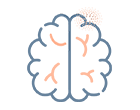Farrar, M. A., & Kiernan, M. C. (2015). The Genetics of Spinal Muscular Atrophy: Progress and Challenges. Neurotherapeutics : the journal of the American Society for Experimental NeuroTherapeutics, 12(2), 290–302. https://doi.org/10.1007/s13311-014-0314-x
Arnold, E. S., & Fischbeck, K. H. (2018). Spinal muscular atrophy. Handbook of clinical neurology, 148, 591–601. https://doi.org/10.1016/B978-0-444-64076-5.00038-7
Arnold, W. D., Kassar, D., & Kissel, J. T. (2015). Spinal muscular atrophy: diagnosis and management in a new therapeutic era. Muscle & nerve, 51(2), 157–167. https://doi.org/10.1002/mus.24497
Kariyawasam, D., Carey, K. A., Jones, K. J., & Farrar, M. A. (2018). New and developing therapies in spinal muscular atrophy. Paediatric respiratory reviews, 28, 3–10. https://doi.org/10.1016/j.prrv.2018.03.003
Lunn, M. R., & Wang, C. H. (2008). Spinal muscular atrophy. The Lancet, 371(9630), 2120-2133. doi:10.1016/s0140-6736(08)60921-6
Frugier, T., Nicole, S., Cifuentes-Diaz, C., & Melki, J. (2002). The molecular bases of spinal muscular atrophy. Current Opinion in Genetics & Development, 12(3), 294-298. doi:10.1016/s0959-437x(02)00301-5






